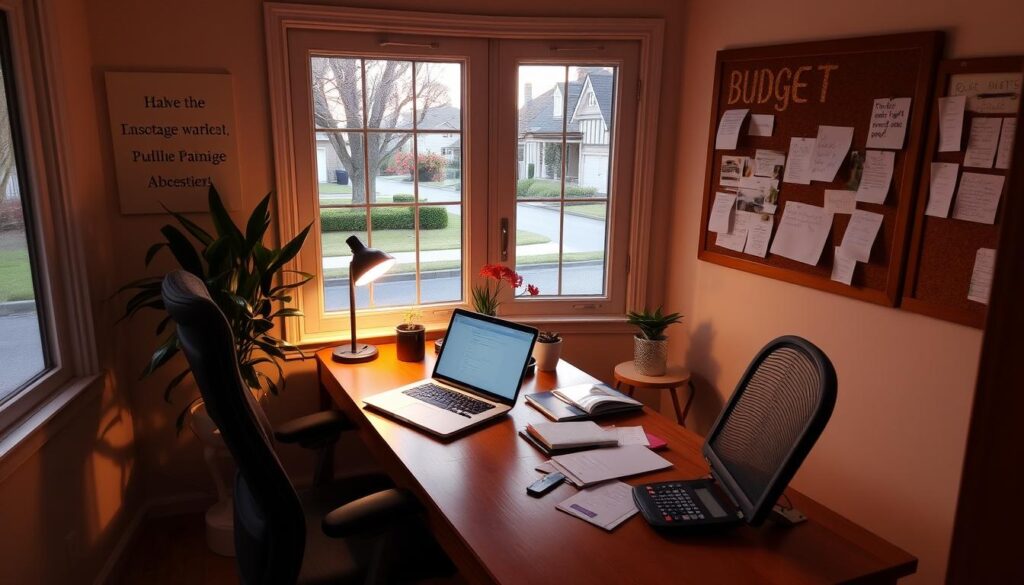Starting on a money journey can be simple. With easy budgeting tips, you can control your money better. You’ll reach your money goals and plan better. Learning budget basics helps you manage cash flow and save more easily.
Key Takeaways
- Effective budgeting can streamline your financial flow.
- Setting clear financial goals is crucial for long-term success.
- Tracking expenses helps in understanding spending patterns.
- Automate bill payments to avoid late fees and stress.
- Regularly review and adjust your budget to stay on track.
- Focus on differentiating between needs and wants.
- Utilize budgeting methods like the 50/20/30 rule.
Why Make a Budget
Making a budget is super important. It shows you how you get and spend your money. Budgeting tips help ensure not a single dollar goes to waste. They set smart spending limits and offer ways to lower your debt. A good budget also helps you plan for big life moments, saving money along the way.
Understand Your Financial Flow
Knowing your financial flow means seeing where your money comes and goes. This step is key to making budgeting tricks that fit your money situation. By keeping an eye on your earnings and spending, you can spot where you spend too much. You also see where you can save. This knowledge lets you make choices that improve your financial health.
Set Financial Goals
Setting financial goals is a big part of budgeting. Having clear, reachable goals gives you focus and a reason to stick to your budget. Goals can be anything from saving for a trip, paying off loans, or starting an emergency fund. Goals encourage you to make smarter money choices. Using budgeting tips to meet your goals can lead to financial security over time.
Know Where Your Money Is Going
It’s key to know how money comes in and goes out for smart money handling. By watching what you spend, you see where money really goes. This shows small costs, like daily coffee, and helps with smart budget tips.
Track Your Expenses
To see your money clearly, start recording every thing you buy daily. Use apps or spreadsheets for noting purchases. Spotting spending habits offers tips to save money and tweak your budget.
Differentiate Between Needs and Wants
It’s important to know the difference between what you need and what you want. Needs are basics—like home, food, and bills. Wants are things you can live without. Knowing this helps you focus on spending for needs, saving more money.
Set Clear Financial Goals
Setting clear financial goals is key to good money planning. It’s about knowing your short-term and long-term needs. This makes managing money easier.
Short-term goals are like clearing a credit card balance or saving for emergencies. They build a strong base. They also make dealing with money stress easier.
Long-term goals aim higher. Think of being debt-free, buying a home, or saving for retirement. To reach these, you need to save smartly and think ahead.
Having these goals helps you use your money wisely. Every choice, from spending to saving, has a clear purpose.
Effective Budgeting Methods
Exploring various budgeting methods can help you find the best plan for you. You can control your money better by using these methods every day. It helps you spend and save wisely.
50/20/30 Budget
This budget splits your income into three parts: 50% for needs, 20% for savings, and 30% for wants. It’s a smart way to make sure you take care of needs and still save. You also get to enjoy some spending.
Pay Yourself First
The ‘Pay Yourself First’ approach means saving before doing anything else with your money. This way makes saving regular and helps grow your emergency fund or save for big dreams.
Zero-Based Budget
Zero-based budgeting gives every dollar a job, making income minus expenses equal zero. It requires careful planning but leads to better money control and less waste. Every dollar has its place.
Envelope Budget
The envelope system uses physical envelopes for different expenses like food and fun. You put cash in each envelope for spending. When it’s gone, you don’t spend until the next refill. It’s great for keeping track of what you spend monthly.
Using these budgeting methods and budgeting hacks offers great personal finance tips. They work for different spending styles and discipline. Pick the method that suits you to manage your finances better starting now.
Create a Zero-Based Budget
Starting with a zero-based budget helps you carefully watch your money. In this plan, every dollar gets a job. These jobs can be for bills, saving money, or paying off what you owe. This way, what you earn minus what you spend equals zero.
List Your Income and Expenses
First, write down all the ways you make money. This includes jobs, side gigs, and any other income. After knowing what you make, list everything you need to spend money on.
Don’t forget regular bills and also things like food and fun activities. This helps you see where your money needs to go.
Allocate Every Dollar
After listing income and expenses, it’s time to give every dollar a place. This is the key part of the zero-based budget. It means planning to spend, save, or use every dollar to pay debts.
It’s important to track each dollar. This helps you see exactly how your money is used. It makes your budget work better for you.
Automate Your Bill Payments
Setting up automate bills is a smart way to manage your money. It saves time and keeps you from forgetting to pay. By using automate bills for things like rent and insurance, you won’t miss payments or get late fees.
Always check your bank account to avoid overdraft fees from automatic payments. Planning and setting up automatic payments helps control your money and reduces worry.
Financial planning strategies help keep your budget in order. This way, you can manage your bills without hassle. It makes sure you have a steady flow of money. Then, you can pay attention to other money matters.
Prioritize the Essentials
Essential spending is key to a good budget. It makes sure your basic needs are met first. You can then focus on what’s important and skip the financial worry. Make sure to spend on important things like your home, food, bills, and getting around.
Focus on Core Needs
It’s key to put your money towards what you really need when budgeting. This means your home, food, keeping the lights on, and moving from point A to B. Doing this first makes life easier and keeps troubles away.
Manage Seasonal Expenses
It’s also important to handle seasonal expenses wisely. Think ahead about costs for things like holidays, vacations, or school supplies. Spread these expenses in your budget over the year. This keeps you from getting financially overwhelmed or messing up your budget.
Adjust Your Budget Monthly
It’s important to tweak your budget often. Doing monthly budgeting makes sure your money habits match your current situation. This way, you can adapt quickly to any changes, like surprise bills or seasonal costs.
Checking your budget every month is key. This check-up spots any spending that’s off track. It helps you make smart changes. You can ensure your money is being used wisely, keeping you financially safe.

- Look back at what you spent and earned last month.
- Find where you spent too much or too little.
- Make needed changes to reach your money goals.
Using these financial planning strategies helps create a strong, flexible budget. This supports your money health over time.
Reduce Unnecessary Expenses
To handle your budget better, cut back on what you don’t need. Small changes can lead to big savings. Using smart budgeting hacks and good money-saving advice can boost your money left over each month.
Identify Where You Can Cut
Start by finding where to spend less. Look at your monthly expenses. See what’s not needed, like eating out less or fewer movie subscriptions. You might also switch to cheaper services for everyday needs.
Track Spending Habits
Watching how you spend is key. Use apps like Mint or YNAB to keep an eye on your spending every day. This shows where your money goes. It shapes better spending habits.
It makes your budget better. You’ll also see where you can save more.
Stick to Your Budget
Sticking to a budget can seem hard, but it’s possible with hard work and smart planning. It’s key to regularly check and update your budget. This helps you stay on track and keep your finances stable.
Track Your Progress
Watching how you do with your budget is very important. Keep an eye on what you spend and save. This helps you understand your money better. Use apps or sheets to track what you earn and spend. This shows trends and helps make good money choices, keeping you on track with your budget goals.
Regularly Review and Adjust
It’s critical to look over and tweak your budget often. Do this monthly to keep up with any income changes or unexpected costs. This makes sure your budget stays useful. By doing this, your financial goals will match up with the latest information. You’ll be more disciplined and proactive.
Using a zero-based budget method is very smart. It helps every dollar go to the right place. This avoids mistakes and wasting money.
Whether you’re new to budgeting or experienced, these tips can really help:
- Keep track of your spending every day to know where your money goes.
- Update your budget every month to keep it accurate.
- Always look for new budgeting tips to improve your plan.
By doing these things, you stick to your budget and build good financial habits for the future.
Budgeting Tips
Getting good at budgeting is key for handling money well. Adding money tips into your day can bring you calm and lasting financial health. Here are the best ways to make sure you stay happy and wise with money.
Practice Contentment
Being happy with what you have is at the heart of a smart budget. It helps you stop buying things on a whim. A thankful heart means you spend less on stuff you don’t need. Use these tips to be content and keep your budget safe.
Give Yourself Grace
It’s important to be kind to yourself while budgeting. Money paths aren’t always straight. Knowing this can ease your mind. When you mess up, it’s okay. Stay hopeful and tweak your plan as you go. Using these tips gently will help you stick to your budget happily.
Conclusion
Creating a budget is key to handling your money well. First, know how money comes and goes in your life. Then, make goals for how to use your money wisely. This helps you manage your cash better. It’s also good to track what you spend and know what you need versus what you want.
There are different ways to plan your budget, like the 50/20/30 rule or paying yourself first. These methods help you spend your money in smart ways. Automatic bill payments and monthly budget reviews help avoid stress. Also, cutting back on extras helps keep your budget on track. Checking your budget often keeps you moving towards your money goals.
Being happy with what you have is very important. Budgeting isn’t just about spending less. It’s about making choices that help your future. With these tips, you can make better money decisions. Staying disciplined in budgeting leads to a brighter tomorrow.
